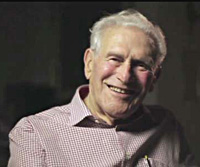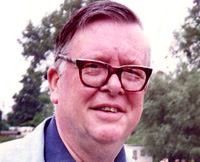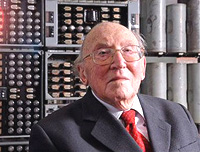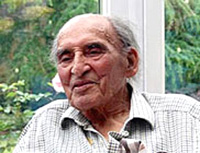Also see the LEOPEDIA Obituaries Section in LEOPEDIA
The Society is sorry to report the deaths of the following members since our last reunion in April 2019
Peter Michael Robert Hermon, b. 13 November 1928, d. 1 November 2022
Peter Hermon Pioneer Behind IT Systems Design Dies aged 93 (in Computer Weekly 18 Nov 2022).
Betty Cooper (Newman), 31st August 2019. LEO 1 and 2 programmer
Brian Elsey, November 2019. Commissioning Engineer
Peter Titman, November 2019. Design Engineer.
Alan Clarke, December 2019. Commissioning Engineer
John Smythson, January 2020. Head of Training
Geoffrey Howells, January 2020. ICL, Melbourne.
Lord Edmund Ironside, 13th January 2020. Head of LEO Government Sales within EELM
Mike Fisher, 27th January 2020. Engineer at Minerva Road
Diane Lewis (Bray), 8th March 2020. Programmer, Leo Bureau.
Alex Williams, March 2020. LEO/ICL Australia
Tony Morgan, 4th April 2020. Senior Commissioning Engineer




Ernest J. Kaye, BSc (Eng)
Ernest Kaye, who died on Saturday 21st April 2012 aged 89, was the last surviving member of the original Leo design team of 4. He joined Lyons in 1949 as assistant to John Pinkerton.
Obituary from The Daily Telegraph.
Biographical note from Peter J Bird book:’LEO The First Business Computer’.
Extract from the the BBC ‘1952 show’ featuring Ernest Kaye.
Wall Street Journal interview.
Pictures from Leo 60th anniversary celebration.
BBC Radio 5 Blog featuring Ernest Kaye.
John Aris John Aris, who started his computer career as a programmer and later a business analyst with Leo, died on 6th August 2010. He had many talents, as can be discovered in the obituaries linked here and in the Leo bibliography.
Obituary from The Guardian (by Frank Land).
Obituary by John Aeberhard‘
Personal tribute by Leo colleague Ray Hennessy.
Sir Maurice Wilkes, DFBCS FREng FRS
Sir Maurice Wilkes died peacefully at home on the morning of 29th November 2010.
Obituary from University of Cambridge (Maurice Wilkes) which includes obituaries from The Telegraph, The Guardian and The Independent.
David Tresman Caminer OBE, Computer Systems Pioneer, died 19 June 2008. aged 92.
He will be well remembered by all ex-Leo employees.
An obituary by Frank Land is reprinted here. There were also obituaries in The Daily Telegraph,The Independent,The New York Times,The Financial Times and The Guardian
a tribute to John Gosden
He was educated at Monmouth College and Corpus Christi College, Cambridge, where he graduated in Mathematics. In 1953 he joined the J.Lyons organisation as a trainee programmer. At that point its small LEO team was engaged on the final trials of the payroll programme for the Cadby Hall bakeries.
The LEO system of the time was equipped with only the most rudimentary systems software. The programmer had to do it all. By the time that Gosden left six years later he had sketched a full body of systems software for the latest LEO system, based on the rich experience he had gathered in himself implementing programs of all kinds and on his study of the most advanced work elsewhere.
A key part of Gosden’s work was in working alongside John Pinkerton, LEO’s Chief Engineer, in ensuring that LEO lll incorporated all the facilities required to meet business application needs.. Thus the system was able to time share with several programs running at the same time and was microprogrammed to enable users to devise new macro- instructions to implement frequently used sequences. Gosden also devised the high level language, CLEO, for the system.
On joining the Auerbach Corporation in the United States in1960 Gosden raised the Standard EDP Reports to new levels and then managed the construction of a multi-computer operating system for the US Navy. Later, at the Mitre Corporation he was responsible for planning the data-base requirements for the Joint Chiefs of Staff and at the Equitable Life Assurance Society of New York he was VP responsible for major projects and policy. Amongst other activities over the years he chaired a committee advising on White House support systems. Well into his retirement he advised the Museum of Modern Art and the Cornell Medical Centre on their data base systems.
Notwithstanding his crowded US career, John Gosden remained very close to his LEO roots. He was Associate Editor of ‘LEO, the Incredible Story of the World’s First Business Computer’ in 1987 and contributed a chapter entitled ‘Toward Systems Software.’ In 2001, although already in failing health he crossed the Atlantic to contribute to the fiftieth anniversary celebrations of the first business computer application in London’s Guildhall.
Please note that further obituaries can be found (Further Obituaries) within LEOPEDIA, the comprehensive collection of Leo Computers references and holdings, put together by Frank Land, FBCS, OBE.
Kit Grindley. started as a Management Trainee in Lyons in 1956 and subsequently was a part of the LEO team of LEO I and LEO II programmers. An obituary by Frank Land is available (Kit Grindley Obituary).
Jackie Caminer, widow of David Caminer, died peacefully at home on 5th January 2017, aged 94. An obituary by her daughter, Hilary, can be read here Jackie Caminer obituary.
Ray Hennessy. Ray started as a programmer in the Leo Bureau at Hartree House, before moving into sales and then Government sales. He died on 15th November 2016. An obituary by John Daines can be seen here (Ray Hennessy Obituary).
Bob Gibson, “One of the stalwarts whose contribution played a key role in the success of LEO”, died in August 2016. An obituary can be seen here (Bob Gibson Obituary).
Wallace Weaving, was the ICL Australian national sales manager in the hardware division, but he started with Leo Computers in the UK before moving to Australia in 1963.
An obituary that was printed in the ICL AllStars Magazine Issue 31 * Autumn 2013 can be read here (Wallace Weaving Obituary) .
Peter Wood, DP Manager of Leo I, the first commercial computer in the country, died in May 2013. He served with distinction in WW2 before joining Lyons. An obituary that appeared in the Whitgift School magazine can be seen here (Peter Wood Obituary).
Norman Bishop, an engineer on Leo machines at Hartree House and site engineer at Fords of Dagenham, died on 20th March 2013. Jacky Bishop, his wife of many years, has kindly provided notes about Bish’s life. (Notes about Bish’s Life).
Ted Rowley, a business and payroll expert who helped in the transfer of Lyons payroll to Leo I, died on 12th January 2013. Some memories of his life have been passed on to us by his daughter, Sharyn and can be read here (Memories of Ted Rowley).
John Coombs, who worked on Leo I and Leo II/1 during the early years of Leo, died in July 2012.
George Manley who died in 2011, was the first Leo apprentice and worked on all the Leo range before becoming Commissioning Manager for the Leo III computers. His colleague, Tony Morgan, has written this (Obituary of George Manley).
Sam King, who was Works Manager at the Leo works at Minerva Road during the era of TRT, Pinkerton, Barnes, Caminer, etc, died in February 2009.
Murray Laver FBCS died on 23 November 2008 aged 93. Murray, a significant figure in Government Computing from 1957, was a strong supporter of Leo Computers. An obituary of Murray Laver can be seen here.
Colin Tully who played an important part in the success of the LEO III range died on December 27th 2007.
A tribute based on an article “Land, F. (2008), Appreciation of Professor Colin Tully 1936- 2007” to be published in the Computer Journal, iObituary of Colin Tully in pdf form.
John Gosden
John Gosden, software pioneer, died in New York on December 18th 2003 at the age of 73. Obituary of John Gosden
Robert E Peel
Bob Peel was an intrinsic part of the Master Routine team with such luminaries as Adrian Rymell, Colin Tully, Nigel Dolby, Sheila Milne and I’m sure a few others whose names I have forgotten. The Intercode Translator team interacted closely with the Master programmers and I remember Bob as a thoroughly pleasant and competent member of that illustrious team. I think he worked on the Allocator/Loader routine which had to take the translator output and do something sensible with it. I remember nothing but the great professional relationship we had with him. John Forbes
